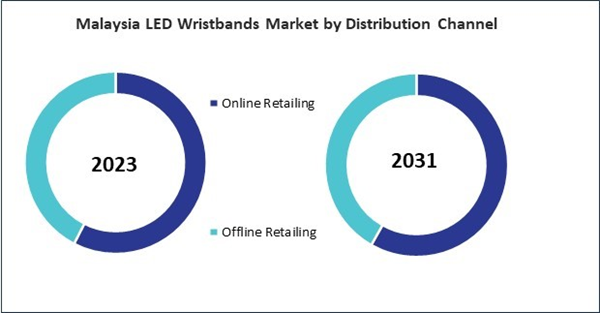LED wristbands with smart functionality represent an innovative evolution in wearable technology, offering a range of uses, advantages, and market trends. These wristbands integrate LED lights with smart features such as Bluetooth connectivity, RFID/NFC capabilities, and sensor technology, enabling a variety of applications. One prominent use is in event management, where these wristbands can serve as access control devices, cashless payment systems, and interactive audience engagement tools. Thus, the India market consumed 285.76 thousand units of smart wristbands in 2023.
The China market dominated the Asia Pacific LED Wristbands Market by Country in 2023, and would continue to be a dominant market till 2031; thereby, achieving a market value of$64.88 millions by 2031. The Japan market is registering a CAGR of 16.3% during (2024 - 2031). Additionally, The India market would showcase a CAGR of 17.8% during (2024 - 2031).
LED wristbands are finding applications in educational settings to enhance student engagement and facilitate interactive learning experiences. Teachers incorporate these wristbands into science, technology, engineering, and mathematics (STEM) lessons, using them for hands-on activities, demonstrations, and group projects. These wristbands make learning fun and memorable while promoting collaboration and problem-solving skills among students.
Innovation in the market is driving continuous advancements in design, functionality, and user experience, leading to the development of more versatile and feature-rich products. One of the significant trends in these wristbands is integrating smart features, transforming them into multifunctional devices. Manufacturers are incorporating Bluetooth connectivity, NFC technology, and companion mobile applications into these wristbands, enabling users to control their wristbands remotely, exchange information, and unlock additional functionalities. These smart features enhance user interaction and expand the utility of these wristbands beyond simple illumination.
As wearable technology becomes more popular in China, it can also lead to overall market growth for these wristbands. According to the State Council of the People's Republic of China, China’s shipments of wearable devices went up 7.5 percent year on year to reach 34.7 million units in the third quarter (Q3) of 2023. Shipments of wristbands in the Chinese market rose by 2.2 percent year on year to 3.98 million units. Also, the growth of wearables shipments in China may drive technological advancements in these wristbands. Manufacturers may incorporate new features, improve connectivity options, and enhance user experiences to stay competitive. Additionally, As the retail sector grows in India, distribution channels for these wristbands will be expanded. As per the National Investment Promotion & Facilitation Agency, the Indian retail sector is projected to develop at a 25% annual rate, reaching $1.1 trillion by 2027 and $2 trillion by 2032. In India, the retail industry contributes more than 10% of the nation’s GDP. Furthermore, the e-commerce industry is anticipated to grow 18% annually through 2025 and reach a gross merchandise value (GMV) of $350 billion by 2030. Thus, the expansion of the retail sectors and the increasing wearable device industry in the region are driving the market's growth.
Based on Price, the market is segmented into Low Price and High Price. Based on Functionality, the market is segmented into With Smart Functionality and Without Smart Functionality. Based on Distribution Channel, the market is segmented into Online Retailing and Offline Retailing. Based on countries, the market is segmented into China, Japan, India, South Korea, Singapore, Malaysia, and Rest of Asia Pacific.
List of Key Companies Profiled
- LG Electronics, Inc. (LG Corporation)
- Sony Corporation
- Panasonic Corporation
- SHARP Corporation
- Samsung Electronics Co., Ltd. (Samsung Group)
- Hitachi, Ltd.
- Koninklijke Philips N.V.
- Cree Lighting (Ideal Industries, Inc.)
- GE Lighting (Savant Technologies LLC)
- ams-OSRAM AG
Market Report Segmentation
By Price (Volume, Thousand Units, USD Million, 2020-31)
- Low Price
- High Price
By Functionality (Volume, Thousand Units, USD Million, 2020-31)
- With Smart Functionality
- Without Smart Functionality
By Distribution Channel (Volume, Thousand Units, USD Million, 2020-31)
- Online Retailing
- Offline Retailing
By Country (Volume, Thousand Units, USD Million, 2020-31)
- China
- Japan
- India
- South Korea
- Singapore
- Malaysia
- Rest of Asia Pacific
Table of Contents
Companies Mentioned
- LG Electronics, Inc. (LG Corporation)
- Sony Corporation
- Panasonic Corporation
- SHARP Corporation
- Samsung Electronics Co., Ltd. (Samsung Group)
- Hitachi, Ltd.
- Koninklijke Philips N.V.
- Cree Lighting (Ideal Industries, Inc.)
- GE Lighting (Savant Technologies LLC)
- ams-OSRAM AG









